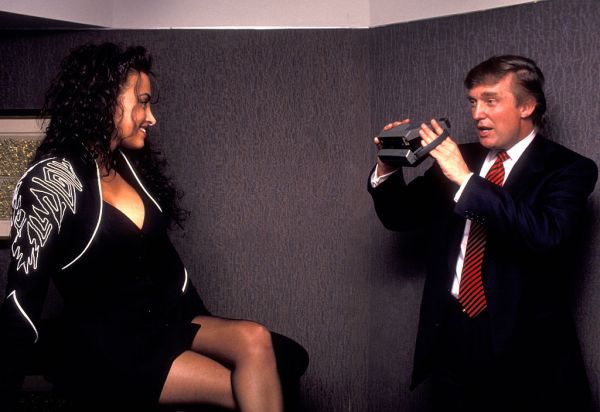At about 35 minutes into the latest Dispatch Podcast, Sarah Isgur proposed two theories for why right-leaning voters might rally behind Donald Trump after his conviction in New York.
The first was obviously her own. “It’s not about Donald Trump,” she said. “It’s about the left. It’s about what this [trial] says about the left, what they’re willing to do to get power.” The grandmas and grandpas who plowed their Social Security checks into the coffers of a billionaire felon since the verdict didn’t do so because they suddenly love Trump. They did it because they’re outraged at Democrats for abusing the justice system to kneecap the Republican nominee for president. “This is negative polarization at its peak moment,” Sarah concluded.
The second theory, she said with a derisive chuckle, is that those who are rallying behind him have always been Trump sympathizers at heart and inevitably would have found an excuse to vote for him in November. If it weren’t the trial in Manhattan, it would have been something else. She attributed this theory to a certain cynical Dispatch colleague whom she declined to identify.
Sitting in my living room listening to that, I felt like Walter White. Say my name.
The thing is, Sarah and I are both right.
There are, assuredly, many Republicans leery of Trump who were always going to find a reason to stick with their tribe this fall. No one believes that the entire 20 percent bloc that keeps voting for Nikki Haley in GOP primaries might end up switching to Joe Biden in the general election. Trial or no trial, most are destined to “come home” to the GOP because that’s what partisans do. Any misgivings they have about Trump’s conviction will make it that much easier for them to justify doing so.
But I don’t doubt that there are right-leaning voters who intended to withhold their vote from him this year in good faith yet are so disturbed by the spectacle of “lawfare” in New York that they’re reconsidering. A piece published on Monday by The Free Press put a few of them on record. I myself received an email this weekend from a longtime friend in politics who refused to vote for Trump in 2016 and 2020 but is considering doing so to protest the verdict if a traditional conservative like Haley or, ahem, Marco Rubio ends up as VP.
These people exist. Sarah isn’t wrong. Conceivably, the backlash among them might decide the election.
And they have a point. When they say “I’m angry at Democrats for using flimsy criminal charges to go after a political opponent,” I understand. It’s a lousy precedent. If a DA is going to haul in a leading presidential candidate in the thick of a campaign, the offense should be grave and the legal theory behind it should be solid as granite. Americans should feel confident that justice in the matter had to be done, and urgently, regardless of the political implications.
The New York case ain’t that.
My problem with Republicans who are mad at Alvin Bragg in good faith comes when they take the next step and say “Trump is now less of a threat to the rule of law than Democrats are.”
My dear friends, do you have brain damage?
Any conservative who finds himself experiencing a pro-Trump conversion after the Manhattan verdict should answer this question: How do you feel about the other 54 criminal charges pending against him?
Fifty-four is a big number, and those charges aren’t ticky-tack “paper crimes” like the ones in New York. The cases pending against Trump have to do with trying to overturn the 2020 election and obstructing the government’s efforts to recover sensitive state secrets hidden at Mar-a-Lago.
Those offenses are grave and the legal theories at stake, particularly in the classified-documents case, are solid. Sarah is one of many lawyers who has looked at the indictment in that one and pronounced it a slam dunk. Trump is barely offering a defense in the matter beyond insisting that the documents somehow magically became his personal possessions by dint of presidential authority.
All three cases bear directly and urgently on his fitness for the presidency. Unless you believe he’s innocent of all 54 charges alleged, you’re contemplating making someone president whom you concede is guilty of serious crimes. That cannot be the “lesser evil” on the ballot with respect to the rule of law.
“I’m more troubled by Democrats trying to put a thumb on the scale of the election than by Trump having a criminal record,” you might reply. That would be defensible—except that Trump himself tried to put his thumb on the electoral scale as president numerous times.
His first impeachment came after he sought to extort Ukraine for damaging information on his electoral opponent. His second impeachment arose when he pressured Republican officials to try to halt the transfer of power to Joe Biden, which is less a matter of putting a thumb on a scale than bashing the scale repeatedly with a clenched fist.
He was happy to abuse the criminal justice system in that effort, too. When Attorney General Bill Barr declared after the 2020 election that the Justice Department had found no evidence of widespread voter fraud, a furious Trump called him into the Oval Office and dressed him down. Barr was then replaced by Deputy Attorney General Jeffrey Rosen, whom Trump reportedly told to “just say that the election was corrupt” and to leave the rest to him and Republicans in Congress. When Rosen wouldn’t play ball, Trump very nearly replaced him with slavish loyalist Jeffrey Clark before the prospect of mass resignations at the Justice Department convinced him to back down.
This is the guy to whom good-faith Republicans must now reluctantly turn to defend the rule of law? The first president in American history to attempt a coup?
Who, days after being elected in 2016, paid millions of dollars to settle legal claims arising from the massive scam that was Trump University?
Who doled out numerous dubious presidential pardons to unworthy cronies in his final days in office and is dangling pardons for other unworthy cronies as a candidate this cycle?
Who was found liable in civil court a year ago for sexually abusing a woman?
Whose election lies four years ago produced an immense vortex of defamation claims that are still being settled today?
Who, if elected in November, intends to use his executive authority to quash the entirely meritorious federal prosecutions he’s facing over the 2020 election and the classified-documents fiasco?
To save the rule of law, you need to actively abet Trump’s attempts to wrestle it into submission?
I could go on, but there are two years’ worth of columns in my archives. You might choose one at random to find additional reasons why choosing Trump as America’s chief law enforcement officer is like making a mafia boss the police commissioner. Even as I write this, new information about the sleaziness with which his team operates in legal settings is emerging.
The most one might say to all of that, I think, is that Trump’s compulsive arson of legal and civic norms doesn’t morally entitle Alvin Bragg to set any fires of his own. That’s true, but neither does it justify preferring Trump for president on grounds that there are, after all, people on both sides who like to play with matches and that therefore one is as good as another.
I think it’s fair to regard Bragg’s prosecution as so questionably motivated that the outcome shouldn’t be held against Trump at the polls even though he received due process and was convicted by a jury of his peers. I do not think it’s fair to say that you’re so upset at the fire set by Alvin Bragg that you must, in good conscience, place a pyromaniac in charge of the fire department.
So why are some good-faith Republicans saying it? Is it brain damage or something else?
The type of voter whom Sarah described on the Dispatch Podcast will come to his or her senses in time, I think.
The burst of outrage that was felt upon seeing a Democratic prosecutor convict the Republican nominee in the middle of a campaign will abate as Trump-skeptical righties remember the reasons they disliked him in the first place. His own antics will accelerate the process: Jonah Goldberg made a shrewd point on the same podcast last week that Trump’s mania over the verdict will throw him wildly off-message on the stump, leading him to rant about the “deep state” at rallies instead of inflation or immigration.
GOP voters might overplay their hands, too. Already populists are doing the things populists always do when they suffer a major political disappointment, with encouragement from their “law and order” hero.
It will take a week or two for public reaction to the verdict to fully “bake in,” but it’s worth noting that there’s been no evidence of a backlash to the verdict in any of the insta-polls published this weekend. (In one survey, 1 in 10 voters in Trump’s party said they’re now less likely to vote for him.) Establishment Republicans have put on a brave face about The People rallying around their nominee, pointing to his gargantuan fundraising haul following the verdict, but I think they’re quietly worried that a felony conviction will do him more harm than good notwithstanding the sympathy from the cohort mentioned by Sarah.
As a case in point, consider how they’ve treated Larry Hogan over the past 96 hours.
Hogan, the GOP’s nominee for Senate in Maryland, issued a terse statement after Trump was convicted, calling on Americans “to respect the verdict and the legal process.” That’s the most a Republican can say in a state as blue as Hogan’s, realistically; any sort of indignation on Trump’s behalf would have been used against him by Democrats to ruin his centrist bona fides and alienate the state’s liberal majority.
In a healthy party, the powers that be would understand that and cut Hogan some slack, knowing that a Senate majority might depend upon him prevailing. Instead, Trump adviser Chris LaCivita flagged his statement on Twitter and declared that Hogan had effectively ended his campaign. Then, when RNC co-chair/nepo-baby-by-marriage Lara Trump was asked about Hogan in a CNN interview, she did for all intents and purposes end his campaign:
To have any chance of winning, Hogan will need Maryland’s Republican minority united behind him and willing to indulge him in certain panders to the center in the name of wooing Democratic voters. By harshly criticizing him, Lara Trump and Chris LaCivita are signaling to populists not to grant him that indulgence. They’re tanking his campaign in plain sight. And by doing so, they’re sparing Democrats from having to divert ad dollars from more competitive states in order to ensure a victory in Maryland. That could plausibly cost the GOP the Senate.
Why would Trump and LaCivita do this?
“Because the American right is a cult whose only political priority is glorifying its leader,” you might say. And, hey—fair enough.
“Because populists care more about ensuring that they control the Republican Party than that the Republican Party controls the government,” you might add. That would also be correct.
But I think they’re mainly making an example of Hogan because they’re nervous that the burst of sympathy for Trump among good-faith Republicans won’t last. They need to try to “lock in” those voters by making outrage over the verdict a partisan litmus test of such immense gravity that they’re willing to forfeit a Senate seat to punish someone for failing it.
Stoking the right’s justified grievances toward Alvin Bragg is also a convenient distraction from the many less justifiable ones that Trump and his party are forever asking good-faith Republicans to adopt. It was and remains a misfortune for anti-Trumpers that Bragg’s indictment was the first to be filed last year, as the questionable nature of those charges probably ended up influencing how the right ended up perceiving the three, much sturdier indictments that followed.
Now that there’s been a conviction, the same phenomenon might be repeating. The more outraged that Republicans can be made to feel toward Bragg, the less likely they’ll be to ask themselves the momentous question I posed earlier: How do you feel about the other 54 criminal charges pending against him?
In effect, both parties are using the outcome in the Bragg case as a type of “rough justice” for Trump. Democrats might feel ambivalent about the charges, but most will equate the verdict with getting Al Capone on tax evasion. After a long life of sociopathy replete with a near-coup against the federal government, Trump has finally faced accountability for something. It might not be legally right, but it’s morally right. For Republicans, though, the logic works in reverse: If Bragg’s attempt to hold Trump accountable was this legally dubious, they ask, isn’t it likely that every other attempt to hold him accountable has also been legally—and morally—dubious?
To my possibly brain-damaged Republican friends who are suddenly struggling with that question, let me help you out: No, it is not likely.
There’s one more question for those who, in their indignation over the trial, are thinking of doing the indefensible by voting for Trump: What lesson do you suppose Trump would learn if he won reelection as president despite being a convicted felon?
During his first impeachment trial, Republican Sen. Susan Collins was asked why she planned to vote to acquit him and famously replied, "I believe that the president has learned from this case. … The president has been impeached. That's a pretty big lesson."
Trump did learn a lesson from that experience, but it wasn’t that he’d better behave himself or he might be impeached again. The lesson he learned was that, no matter what he did, Senate Republicans would never dare cross their base by removing him from office. If not for him learning that lesson, the events that led to his second impeachment trial might not have occurred. Collins did vote to convict him at that second trial, but to no avail. Too late.
At the New York Times today, Peter Baker considered the incentive structure that Republicans are creating by rallying around Trump. “If he wins, it means he will have survived two impeachments, four criminal indictments, civil judgments for sexual abuse and business fraud, and a felony conviction,” Baker wrote. “Given that, it would be hard to imagine what institutional deterrents could discourage abuses or excesses.”
At every turn, Trump’s called on Republican voters to demand that he be placed above the law. At every turn, they’ve obliged. And at every turn, he’s seemed to gather more confidence that he can outmaneuver any form of official accountability that’s thrown his way.
If he returns to office, he will assuredly do things as president that place him in criminal jeopardy when his term ends. (It’s not just retrospectively that he craves “absolute immunity” from the Supreme Court.) Maybe he’ll pardon himself, attempting to write his own “get out of jail free” card. Or maybe he’ll do something illicit during the 2028 campaign to favor the Republican nominee, knowing that a self-pardon might not hold up in court and he’ll need a friendly face in the White House to shield him from justice.
Or maybe he’ll connive to extend his term illegally somehow, as I expect. Anything could happen. And anything probably will.
Reelecting Trump would mean committing this country to four more years at least of crimes, near-crimes, ethical nightmares, self-dealing, litigation, authoritarian abuses, one or more impeachments, multiple constitutional crises, and another attempted autogolpe that may or may not succeed. If, after digesting all of that, you still think he’s the “lesser evil” with respect to the rule of law, see a neurologist.







Please note that we at The Dispatch hold ourselves, our work, and our commenters to a higher standard than other places on the internet. We welcome comments that foster genuine debate or discussion—including comments critical of us or our work—but responses that include ad hominem attacks on fellow Dispatch members or are intended to stoke fear and anger may be moderated.
With your membership, you only have the ability to comment on The Morning Dispatch articles. Consider upgrading to join the conversation everywhere.